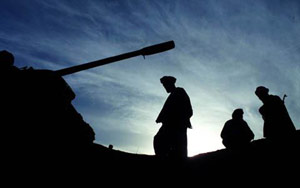
Analysts and regional experts agree there is no easy way forward to guide Afghanistan out of nearly nine years of war.
Violence has reached record levels in recent months, as the Taliban intensifies its insurgency, and NATO and Afghan forces bear down on militant strongholds.
Officials view the donor conference in Kabul as the follow-up to a January conference in London where Afghan President Hamid Karzai pitched his plan to reintegrate Taliban militants willing to lay down their weapons.
At that time, representatives from 60 countries pledged more than $140 million to a fund designed for reintegration. But last week, the British Ambassador to Afghanistan, William Patey, told reporters that most of this money still has not been provided.
"The UK is actually the only country to actually have given, put money - physically put money - into the reintegration fund," he said. "Other countries have pledged money, but the only check that has been delivered is the UK's check."
Patey says Britain has delivered about $3 million into the hands of the Afghan government for reintegrating militants, and he pledges to deliver even more.
Despite the lack of other concrete donations, the former presidential rival of Mr. Karzai, Abdullah Abdullah, tells VOA he does not doubt the commitment of the international community heading into the Kabul conference.
"But will the Afghan side be able to deliver on what it promises to the people of the Afghanistan or to the international community? It has failed many times, the Afghan side," he said.
He points to ever-present allegations of government corruption leveled at the Karzai administration. Meanwhile, Afghan government officials continue to blame international organizations for their own corruption in the country.
Former Afghanistan Cabinet member Hamidullah Farooqi says the international community ultimately cannot solve Afghanistan's problems by throwing money at them.
"They know the consequences. I do not think that they are going to be able to buy the situation by money," he said. "Only they should sacrifice to defend Afghanistan and defend the region and also defend the international community."
He says this sacrifice will be in the form of a long-term presence in the region and not determined military withdrawals.
"That will be a repeat of the failed strategy and the failed action which they did in this region in particular," he said.
He says if coalition countries leave Afghanistan completely, a power vacuum will exist, causing more violence as regional powers fight their proxy wars. Regional experts say this is what gave rise to the Afghan Taliban in the 1990s after the Soviets withdrew from the country, and the United States largely left Afghanistan and Pakistan to their own devices.
Karzai critic, Abdullah Abdullah, says the Afghan people need transparency in whatever actions take place. He says they want a lasting peace, not a never-ending lineup of international conferences and communiques.
"Behind-the-doors talks, a sort of rubber stamp meeting and then feeding it to the people does not inspire confidence or trust," he said.
US officials say they hope the conference in Kabul will highlight the Afghan government's plan to improve governance and stability in the war-torn country.
It is the largest international meeting in Afghanistan since the 1970s. Analysts expect it to focus on generating support for Mr. Karzai's plans to build security and good governance, and reintegrate reconcilable elements of the Taliban into government security forces.
proxy war: a war instigated by a major power that does not itself participate 代理戰(zhàn)爭(zhēng)
communique: 公報(bào)
'Friendly fire' kills Afghan soldiers
NATO struggles to build viable police force in Afghanistan
NATO defense chiefs cite progress in Afghanistan, but see challenges ahead
NATO's Afghan strategy taking longer than expected
(來(lái)源:VOA 編輯:陳丹妮)
